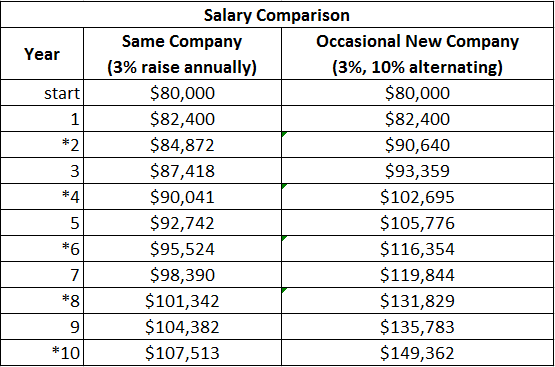Managers from the Baby Boomer generation (and those from Gen X who have similarly professional preferences) are likely to view millennials as disloyal, pampered, and self-important. They’re not wrong.
At least, they’re not wrong in their understanding of employment and millennials’ preferences in the workplace. This comparison of generational expectations in the workplace asserts that baby boomers expect hard work, sacrifice, and teamwork. Conversely, I feel that millennials (especially those in tech) expect to be given difficult problems to cut their teeth on, resources to overcome obstacles in solving the problem, and enough autonomy to solve it their way. To be fair, it is somewhat presumptuous to expect that you can add as much value as someone twenty times your senior, which explains why boomers might view millennials as self-important. But that’s what tech promises: meritocracy.
So even if companies promise these opportunities to millennials, why do they change companies so often? The short answer is that they are incentivized to do so. In fact, this Forbes article explains how employees who stay in companies longer than two years earn 50% less than their peers who jump ship. This is because the typical salary raise for an employee who stays at a company is 3%, versus 10% for those who are changing jobs. Over a career, this 7% difference adds up, and someone who is on their 5th job would be earning significantly more than someone who is not. I played around with this a bit, and came up with the following table detailing the difference:

The years marked with an asterisk are those years where there was a 7% difference (10% versus 3%) in pay raise. So over only 10 years, the occasional company change resulted in a 40% difference in salary (to say nothing of the aggregated lost wage difference).
When faced with this kind of data, it’s pretty hard to blame millennials for being disloyal.
Which brings us to how tech companies are responding, and subsequently why millennials can seem pampered (hint: it’s because we are).
I will use myself as a case study: this summer I will be joining Palantir Technologies in their London office. In my contract and Palantir’s website, the perks that are becoming increasingly commonplace abound: no set hours, media and gaming rooms, free food, etc. These perks make the office a great place to work, but that’s not all companies are doing to retain talent.
Stock options are a great way to align an individual’s incentives with company performance. The more skeptical have argued that the drawback of this alignment is that stock options make it hard to leave a company. As Julie Evans describes in her article detailing things you should know about stock options, there is often a vesting period where the employee does not actually receive their stock options in full until several years after beginning employment (see the article for more details). While I understand that this is a potential drawback, I have a serious bias in favor of anything that could be considered an alignment of incentives, so I support the granting of stock options. In my mind, if you care enough about the problems a company is trying to solve, you will want to spend at least a few years there anyway.
So at the end of the day, every employee has to choose for themselves: chase a higher salary by changing jobs every couple years, or be satisfied with being well fed while you tackle challenging work. This is a decision that employees must make every year: to stay or not to stay.
And the subtext underlying that presumption is why boomers think that millennials are disloyal, pampered, and self-important: we are, we know it, and we love it.